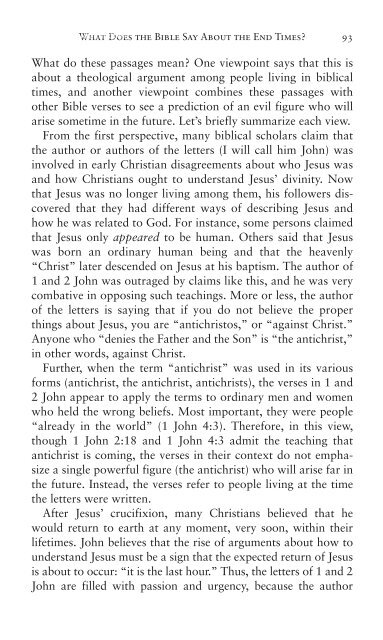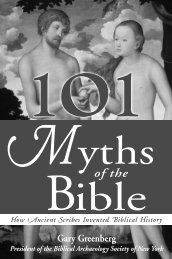Rapture, Revelation, and the End Times - Conscious Evolution TV
Rapture, Revelation, and the End Times - Conscious Evolution TV
Rapture, Revelation, and the End Times - Conscious Evolution TV
Create successful ePaper yourself
Turn your PDF publications into a flip-book with our unique Google optimized e-Paper software.
What robin-bobin Does <strong>the</strong> Bible Say About <strong>the</strong> <strong>End</strong> <strong>Times</strong>? 93What do <strong>the</strong>se passages mean? One viewpoint says that this isabout a <strong>the</strong>ological argument among people living in biblicaltimes, <strong>and</strong> ano<strong>the</strong>r viewpoint combines <strong>the</strong>se passages witho<strong>the</strong>r Bible verses to see a prediction of an evil figure who willarise sometime in <strong>the</strong> future. Let’s briefly summarize each view.From <strong>the</strong> first perspective, many biblical scholars claim that<strong>the</strong> author or authors of <strong>the</strong> letters (I will call him John) wasinvolved in early Christian disagreements about who Jesus was<strong>and</strong> how Christians ought to underst<strong>and</strong> Jesus’ divinity. Nowthat Jesus was no longer living among <strong>the</strong>m, his followers discoveredthat <strong>the</strong>y had different ways of describing Jesus <strong>and</strong>how he was related to God. For instance, some persons claimedthat Jesus only appeared to be human. O<strong>the</strong>rs said that Jesuswas born an ordinary human being <strong>and</strong> that <strong>the</strong> heavenly“Christ” later descended on Jesus at his baptism. The author of1 <strong>and</strong> 2 John was outraged by claims like this, <strong>and</strong> he was verycombative in opposing such teachings. More or less, <strong>the</strong> authorof <strong>the</strong> letters is saying that if you do not believe <strong>the</strong> properthings about Jesus, you are “antichristos,” or “against Christ.”Anyone who “denies <strong>the</strong> Fa<strong>the</strong>r <strong>and</strong> <strong>the</strong> Son” is “<strong>the</strong> antichrist,”in o<strong>the</strong>r words, against Christ.Fur<strong>the</strong>r, when <strong>the</strong> term “antichrist” was used in its variousforms (antichrist, <strong>the</strong> antichrist, antichrists), <strong>the</strong> verses in 1 <strong>and</strong>2 John appear to apply <strong>the</strong> terms to ordinary men <strong>and</strong> womenwho held <strong>the</strong> wrong beliefs. Most important, <strong>the</strong>y were people“already in <strong>the</strong> world” (1 John 4:3). Therefore, in this view,though 1 John 2:18 <strong>and</strong> 1 John 4:3 admit <strong>the</strong> teaching thatantichrist is coming, <strong>the</strong> verses in <strong>the</strong>ir context do not emphasizea single powerful figure (<strong>the</strong> antichrist) who will arise far in<strong>the</strong> future. Instead, <strong>the</strong> verses refer to people living at <strong>the</strong> time<strong>the</strong> letters were written.After Jesus’ crucifixion, many Christians believed that hewould return to earth at any moment, very soon, within <strong>the</strong>irlifetimes. John believes that <strong>the</strong> rise of arguments about how tounderst<strong>and</strong> Jesus must be a sign that <strong>the</strong> expected return of Jesusis about to occur: “it is <strong>the</strong> last hour.” Thus, <strong>the</strong> letters of 1 <strong>and</strong> 2John are filled with passion <strong>and</strong> urgency, because <strong>the</strong> authorrobin-bobin





